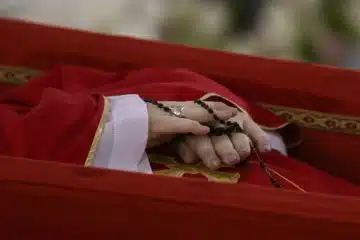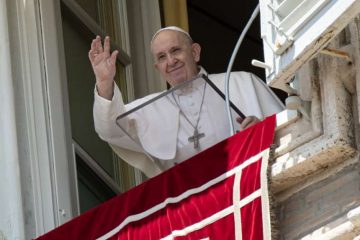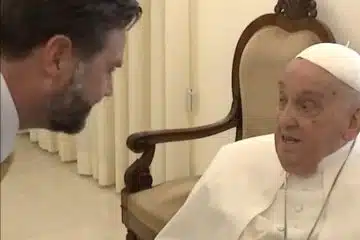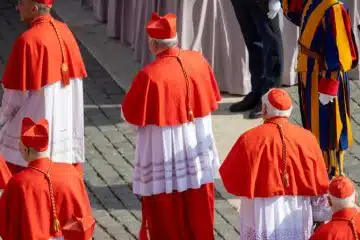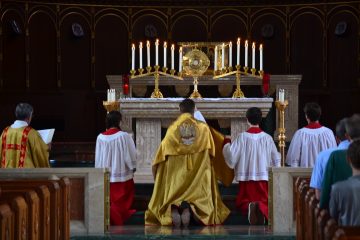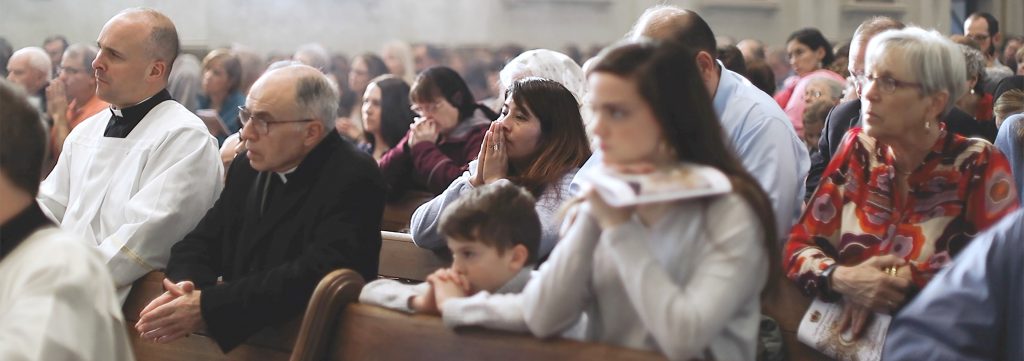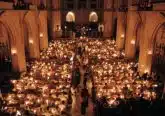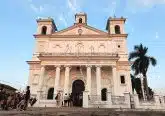The Case for Sunday
by Father Ryan T. Ruiz
After months of no public Masses, church doors are open again. But in the age of live-streaming Mass directly into homes, why should Catholics continue to attend Mass in person on Sundays?
March 8, 2020: the day on which Catholics of this archdiocese were last obliged to actively participate in the Sunday Eucharist. It remains a surreal reality to contemplate. For the first time in generations, the faithful were dispensed from an obligation that strikes to the heart of their identity as members of the domus Dei – the house of God. This unforeseen and lengthy Eucharistic fast has brought much suffering. However, the collective sense of salvation history, and the hope that arises from it, is too long for us to lose sight of God’s constant activity in the life of His people – even when clouds cover the sky, a common occurrence in southwest Ohio!
Yet now as we have been able to gather once again at Mass, we face another interesting challenge. I imagine that for most, the importance of Sunday has never been in question. Sunday is the day of the Lord, after all, a day dedicated to His praise and glory. However, for others Sunday has sadly morphed into just another day of the week. Certainly this mentality is not the result of the current pandemic, as signs of Sunday’s atrophy have unfortunately grown stronger with each passing year of each passing decade. Nevertheless, having been precluded from gathering on the day that St. Augustine termed “the Sacrament of Easter,” a day on which Christians from time immemorial exercised their baptismal priesthoods and celebrated the presence of the Risen Lord in their midst, has certainly not helped to stem the tide. Thus, perhaps even for us who have no doubts about Sunday’s significance, a reminder about its true identity and character could be of benefit.
WHAT CASE, THEN, CAN BE MADE IN DEFENSE OF SUNDAY?
Well, to begin with the most obvious, it is the veritable “day of the Lord.” In 1998, St. John Paul II wrote an apostolic letter dedicated to the reality of Sunday in the life of the Church. In this letter the pope reflected on the theme of God’s rest as found in Genesis. When God rested from His work on the seventh day it was not a static form of rest, a kind of “divine inactivity;” rather, when God rested, He rested in order to gaze lovingly on all that He created so as to delight in it (Dies Domini 11). God’s rest is oriented towards communion with the creatures He made in His image and likeness, creatures whose own approach to “rest” should mimic His. Thus, “Sunday rest” cannot merely be seen as a cessation of work, but rather a cessation of work that enables us to celebrate the mystery of God.
Consequently, Sunday is not only the day of the Lord, but also the day of the Church. Granted, there is not a day in the liturgical year – save for Good Friday and Holy Saturday morning – when the Eucharist is not celebrated. However, it is at the Sunday Mass in which the local Church most readily exemplifies its vocation as the “Sacrament of Unity” (Sacrosanctum Concilium 26). It is here that so many “domestic
churches,” individual families and households that comprise the principal nucleus of the parish and diocese, gather as one to offer fitting worship to God. It is at the Sunday Eucharist that the Church on earth – you and I – have the opportunity to engage in what St. Augustine called an “exercise of desire,” a looking forward to eventual worship of God in the banquet halls of Heaven. It is for this reason that many of the ancient Church Fathers not only entitled Sunday the “first day of the week,” but also the “eighth day,” a day of unique status that points both to participation in the earthly worship of the Lord, and to that in the world to come.
And this leads us to a final argument in defense of Sunday: it is the day of the Human Person. In a world that suffers from external tragedies and internal angst, the dedication of one day a week to the mental activity of “remembering” is vital to human flourishing. The festive nature of the Sunday Eucharist allows the faithful to put their daily concerns into their proper perspective. As Pope Francis notes, a believer is “essentially ‘one who remembers’” (Evangelii Gaudium 13). We remember that it was on a Sunday that the Lord defeated death; we remember that it was on Sundays that the early Christians gathered to memorialize Christ’s Paschal Mystery; we remember that it is on Sundays that our hearts are to be filled with the joy of the Lord, thus transforming the rest of our week.
Although Catholics are temporarily dispensed from the obligation to assist at Mass on Sundays, we long for the day when that obligation is restored. For an obligation need not be an imposition, but rather an invitation to “never forget” that which makes us who we are: beloved sons and daughters of God, redeemed by Christ, and filled with the Spirit, Who leads us into the joy of our perpetual rest with the Lord.
This article appeared in the July edition of The Catholic Telegraph Magazine. For your complimentary subscription, click here


